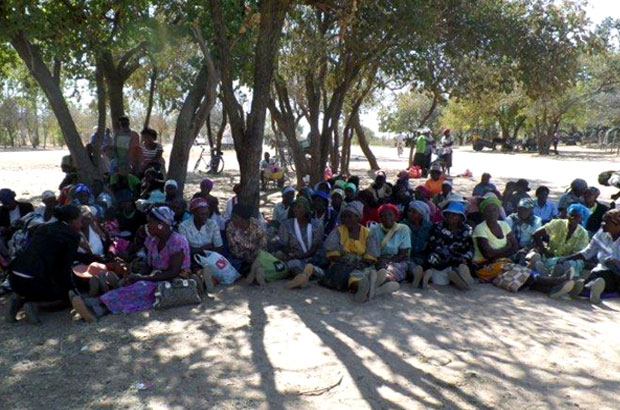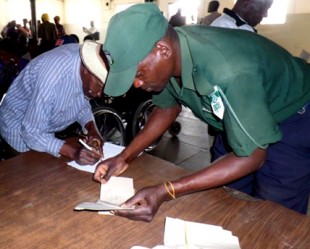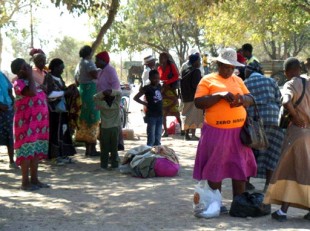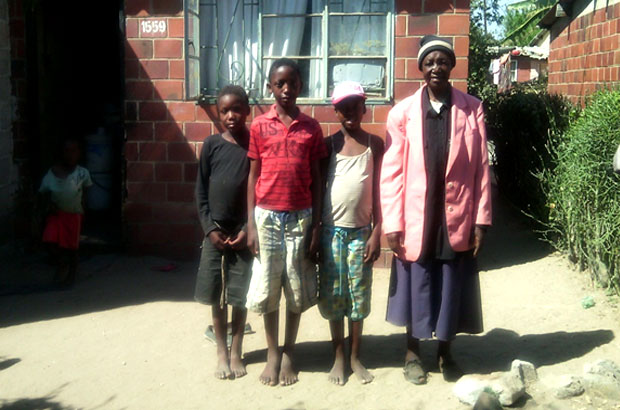Last week I met Nyasha, an inspirational woman who left me determined never to moan or complain again. About 70 years of age, Nyasha lives in a small community outside of the city of Bulawayo, the second largest city in Zimbabwe. As a beneficiary of the Harmonised Social Cash Transfer (HSCT) programme, part of the DFID funded Child Protection Fund, she kindly agreed to let me and a representative from the Ministry of Public Service Labour and Social Welfare speak to her about her experience of being on Zimbabwe's primary social protection programme.

Nyasha welcomed us to her home; a tiny room (smaller than my bedroom alone) that doubled up as a kitchen and a bedroom. She explained that her son was in prison, having been arrested for murder, and his wife had died. As a result she had been left as the primary carer of his 5 children (aged 5- 17), 4 of whom were sitting politely at the door, staring up at us. It was hard to believe that 6 people could live within such a tight space.
Nyasha told us that she used to work - she had a small garden where she grew a few vegetables to sell. However her diabetes and high blood pressure, along with the large amount of time required to care for the youngest child who was HIV positive, meant that she no longer had the time or energy to tend to her garden. As a result, it had now been taken over by another family in the community.

Nyasha owned a spare room which she rented to a lodger for $50 a month. She could have charged him more but the electricity and water had been cut due to the $1000 of debt she had accumulated due to unpaid bills and the effects of the hyperinflation period (2008-9), when the value of Zimbabwean dollar halved overnight and eventually became worthless.
UK aid is helping people like Nyasha. Food-poor and unable to work, Nyasha’s household is one of 55,500 families who are benefitting from HSCT programme. Eligible households, identified through a rigorous targeting and verification process, receive unconditional bimonthly cash payments, ranging from $20 – $50, every 2 months.

The monthly HSCT stipends protect beneficiary households from risks and shocks, and are often the only source of income they receive. I spoke to over 30 beneficiaries as they collected their cash transfers from accessible pay points within their district. I learnt that most of them spent the cash on basic commodities, such as mealie-meal (the staple starch food in Zimbabwe), rent and school fees. One young girl told me that she was now eating two meals a day rather than just one, and a few beneficiaries in the rural areas told me that after the first few payments they were able to form ‘lender and saver clubs’, enabling them to save enough money to buy a goat or chicken.

Nyasha gets $40 every 2 months. She told us she spends $35 of this on 50kg of mealie meal, leaving her with just $5 for other expenses over the 2 months. The 50kg bag would feed the 6 of them for about 6 weeks, therefore enabling her to use some of the $50 rent money to begin to pay off her debts.
I can’t say the future is bright for Nyasha but it’s clear that the HSCT programme is providing critical support to her and her family. As we drove away, watching the family wave us goodbye, I clutched at the idea that this support would at least keep a roof over their heads, provide enough food on the table to keep the children in school and get Nyasha get back on her feet.

Keep in touch. Sign up for email updates from this blog, or follow UK in Zimbabwe on Twitter and Facebook.

Recent Comments